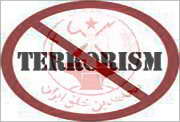MKO with blood on their hands to be tried in Iraq and in Iran, Camp Ashraf to close within two months
Rubaie: Iraq to Extradite MKO Terrorists
TEHRAN (FNA)- Iraq plans to extradite members of an anti-Iran terrorist group who have “Iranian blood on their hands,” Iraq’s national security adviser said Friday during a visit to Tehran.
“Among the members of this group, some have the blood of Iraqi innocents on their hands (and) we will hand them over to Iraqi justice, and some who have Iranian blood on their hands we can hand over to Iran,” said Muwafaq al-Rubaie.
He was referring to the terrorist Mojahedin-e Khalq Organization (MKO).
“Over 3,000 inhabitants of Camp Ashraf have to leave Iraq and the camp will be part of history within two months,” Rubaie reiterated in a joint news conference with Saeed Jalili, Secretary of Iran’s Supreme National Security Council.
“The only choices open to members of this group are to return to Iran or to choose another country,” Rubaie said.
“We are acting under international humanitarian regulations and international laws. These people will themselves choose where they want go.”
“Iran’s security cannot be threatened by any factor inside Iraq. Iran’s security is our own security,” the Iraqi official underlined.
His words were translated from Arabic into Farsi by an official Iranian interpreter.
Rubaie said that 914 MKO members had a “passport or residence of a third country” and could leave Iraq for these countries.
“Some 914 of them have dual nationalities and others who want to return to Iran will be allowed to do so,” Rubaie said, adding he would discuss the issue with officials from 12 countries to see if they would accept MKO members.
“They will leave Iraq in a non-forcible way,” he said. “Terrorist groups have no place in Iraq.”
The Iraqi government announced on December 21 it planned to close the Ashraf camp north of Baghdad and close to the Iranian border, where around 3,500 MKO members are held.
On January 1, Iraqi Prime Minister Nuri al-Maliki said he would expel the MKO from the country.
The MKO was created in 1965 with the aim of overturning the regime of the Shah of Iran, but now is seeking the overthrow of Iran’s current government.
It was supported by Iraq’s late dictator Saddam Hussein, and it had carried out deadly raids on Iran from Iraq.
Despite being listed as a terrorist group by the United States and the European Union, the MKO receives wide support from Washington and London.
The European Court of Justice last month overturned an EU order freezing its funds.
Group members fought alongside Iraqi forces in the 1980-1988 war between Iraq and Iran and then settled in Iraq.
The MKO is behind a slew of assassinations and bombings inside Iran, a number of EU parliamentarians said in a recent letter in which they slammed a British court decision to remove the MKO from the British terror list. The EU officials also added that the group has no public support within Iran because of their role in helping Saddam Hussein in the Iraqi imposed war on Iran (1980-1988).
Many of the MKO members abandoned the terrorist organization while most of those still remaining in the camp are said to be willing to quit but are under pressure and torture not to do so.
A May 2005 Human Rights Watch report accused the MKO of running prison camps in Iraq and committing human rights violations.
According to the Human Rights Watch report, the outlawed group puts defectors under torture and jail terms.
The group started assassination of the citizens and officials after the revolution in a bid to take control of the newly established Islamic Republic. It killed several of Iran’s new leaders in the early years after the revolution, including the then President, Mohammad Ali Rajayee, Prime Minister, Mohammad Javad Bahonar and the Judiciary Chief, Mohammad Hossein Beheshti who were killed in bomb attacks by MKO members in 1981.

